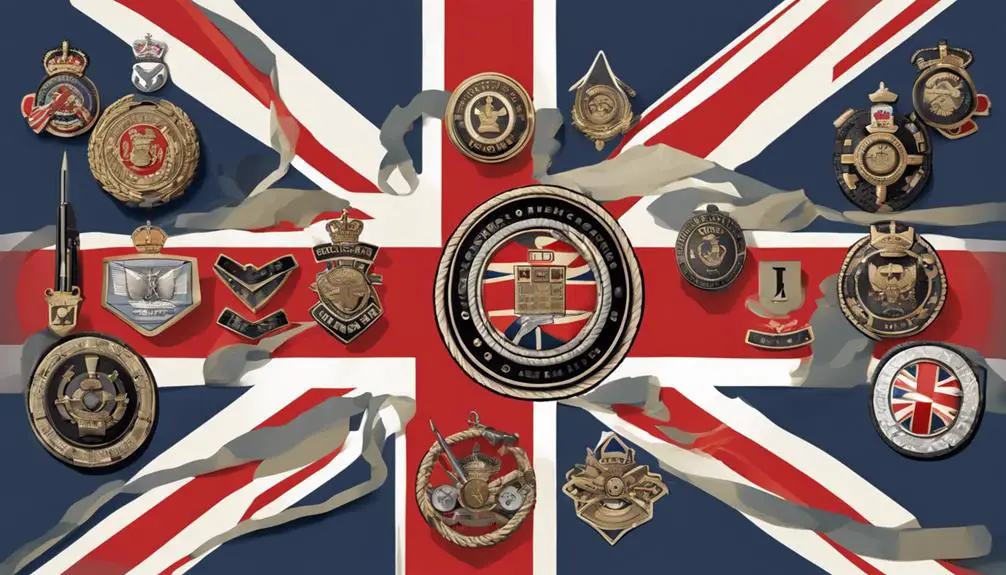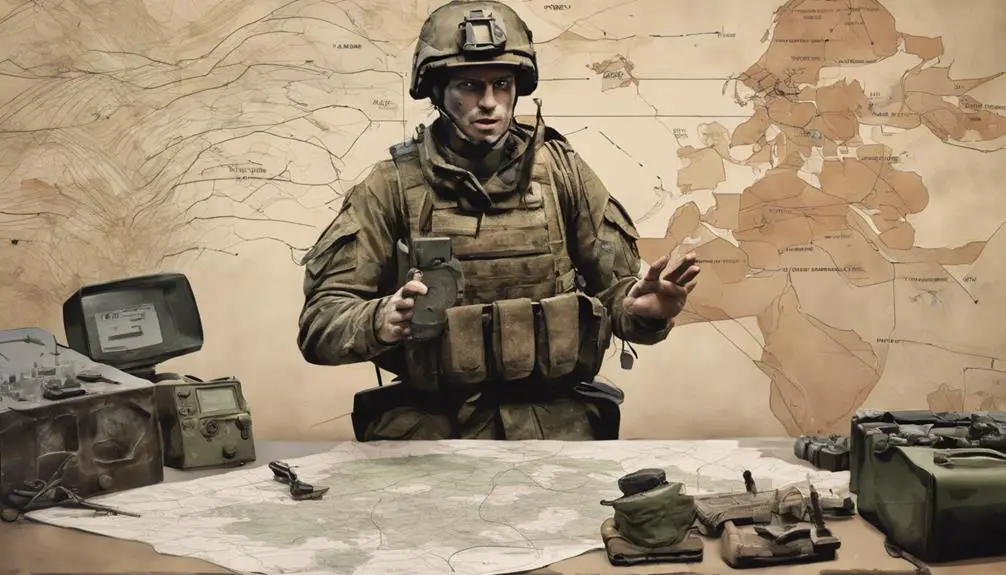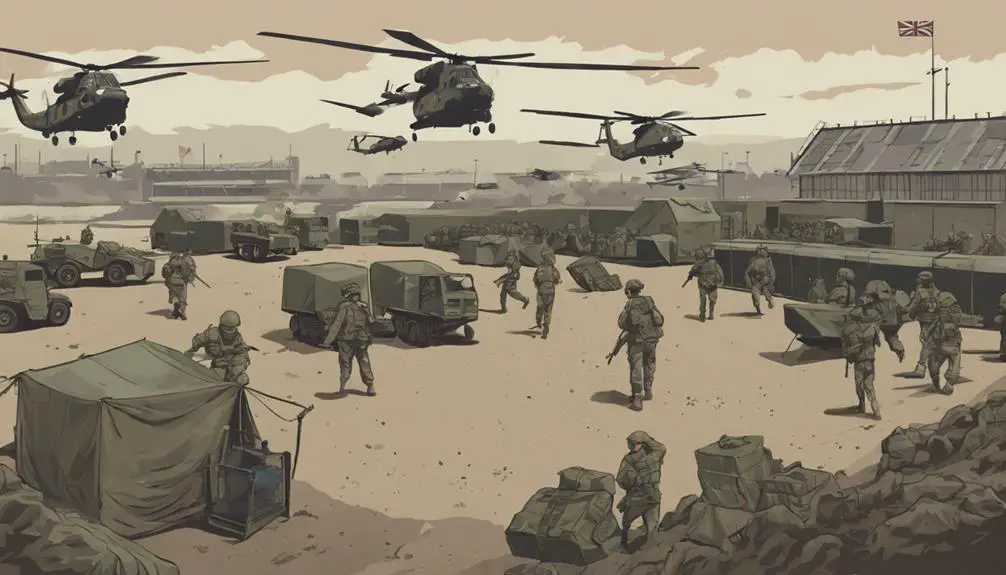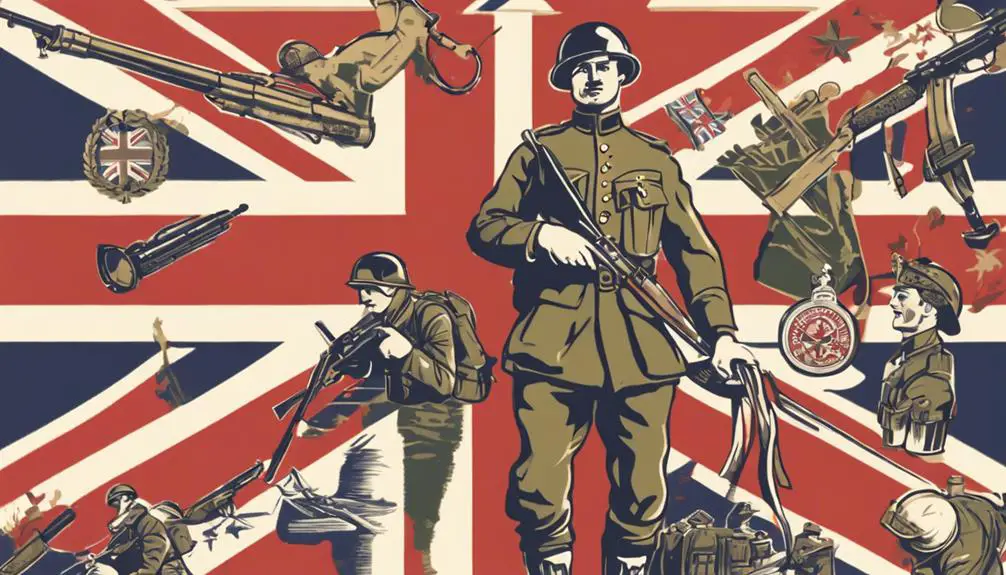You'll encounter a distinct dialect in the British military, where words and phrases like 'Ruperts,' 'Squaddies,' and 'Oscar Mike' are woven into everyday conversation, revealing a complex tapestry of camaraderie, shared experiences, and tactical efficiency. Slang terms disguise ranks and roles, fostering camaraderie and esprit de corps. You'll find colloquialisms that convey emotions, describe psychological states, and facilitate clear communication in battle. As you explore this unique language, you'll gain insight into the psychological challenges of military life and the ingenuity that defines British military culture – and discover there's even more to uncover.
Slang for Ranks and Roles

As you explore the world of British military slang, you'll discover that ranks and roles are often disguised behind a veil of colloquialism, with terms like 'Ruperts' and 'Squaddies' being used to describe officers and enlisted personnel, respectively. This colloquialism serves as a way to create a sense of camaraderie and esprit de corps within the military ranks.
'Ruperts', for instance, is a term used to affectionately refer to officers, often implying a sense of respect and admiration. On the other hand, 'Squaddies' is a colloquialism used to describe enlisted personnel, conveying a sense of camaraderie and shared experience.
Within the rank hierarchy, these terms are used to create a sense of distinction between officers and enlisted personnel. The use of 'Ruperts' and 'Squaddies' serves as a way to reinforce the existing rank structure, while also acknowledging the shared experiences and challenges faced by military personnel.
Terms for Emotions and States
You'll find that British military slang also extends to describing emotions and states, where colloquialisms like 'gutted' and 'mullered' are used to convey intense emotions like disappointment and exhaustion. These slang terms provide a unique insight into the psychological toll of military service.
| Term | Meaning |
|---|---|
| Gutted | Extremely disappointed or saddened |
| Mullered | Exhausted or drained, often due to physical or mental strain |
| Battle Fatigue | A state of physical, emotional, and mental exhaustion caused by prolonged combat |
| Combat Stress | A psychological response to the trauma of combat, often characterized by anxiety, fear, and hypervigilance |
| Brassed Off | Extremely frustrated or annoyed, often due to bureaucratic red tape or incompetence |
In the British military, these slang terms are often used to express emotions and states that are difficult to articulate. By understanding these colloquialisms, we can gain a deeper appreciation for the complexities of military life and the psychological challenges faced by service personnel.
Military Operations and Actions

During military operations, British service personnel employ a distinct lexicon to describe actions, maneuvers, and tactics, exemplified by terms like 'crack on' and 'Oscar Mike', which convey a sense of urgency and momentum. You'll often hear 'crack on' used to signal the start of an operation or to urge troops to accelerate their pace.
'Oscar Mike', derived from the NATO phonetic alphabet, means 'on the move' and is used to confirm that a unit is moving or in transit.
In the heat of battle, clear communication is vital, and British military slang facilitates this. 'Battle Drills' refer to standardized procedures for responding to specific scenarios, such as an ambush or enemy contact. These drills enable troops to react swiftly and effectively, minimizing confusion and ensuring a cohesive response.
Meanwhile, 'Op Tempo' (Operational Tempo) describes the pace at which military operations unfold. It's crucial to maintain a high Op Tempo to achieve strategic objectives and gain a tactical advantage.
Equipment and Supplies Slang
British military personnel rely on a range of slang terms to efficiently communicate about equipment and supplies, from 'Basha' – a makeshift shelter constructed from available materials – to 'Sangar', a fortified sentry post, highlighting the resourcefulness and adaptability required in the field.
As you explore the world of military slang, you'll discover a 'Gadget Glossary' of terms that might confuse civilians but are second nature to soldiers. 'Kit Konfidential', for instance, refers to the essential gear and equipment issued to personnel, which they're expected to keep in top condition.
In the British military, even the most mundane items have unique nicknames. 'Bivi bags' are waterproof sleeping bags, while 'Hexi' refers to a portable, compact cooker. 'Sangar' and 'Basha' are just a few examples of the many terms used to describe makeshift fortifications and shelters.
These slang terms not only facilitate quick communication but also reflect the ingenuity and creativity required to adapt to challenging environments. By understanding these terms, you'll gain insight into the daily lives of British military personnel and the resourcefulness that defines their profession.
Bases and Deployments Lingo

Military personnel deploy to various bases and installations, each with its own distinct character and purpose, from the Forward Operating Base (FOB) to the Patrol Base (PB), where troops live and operate in close proximity to the local population.
You'll soon become familiar with the unique culture and lingo that develops within these bases. In an FOB, you'll experience 'Camp Life', where daily routines, mess hall food, and living quarters become a temporary norm. FOB Culture is a unique blend of camaraderie, shared experiences, and humor that helps troops cope with the stresses of deployment.
You'll hear expressions like 'back at the FOB' or 'up at the PB', which refer to returning to the relative safety of the base or moving to a more forward operating position. As you navigate these bases, you'll pick up on the nuances of military slang, where 'tabbing' means moving on foot, and 'casevac' refers to a medical evacuation. Understanding this lingo is essential to communicating effectively and being part of the team.
Frequently Asked Questions
Can Non-Military Personnel Use British Military Slang Terms?
You might wonder, can anyone use certain slang terms, or are they exclusive to a specific group? This raises questions about cultural appropriation, where one culture adopts elements of another without permission or understanding.
In everyday language, using terms without context or respect can be problematic. When it comes to British military slang terms, it's essential to consider the origins and connotations before adopting them into your vocabulary.
Are British Military Slang Terms Used in Other English-Speaking Countries?
As you venture beyond the UK's borders, you'll find that linguistic influence knows no bounds. In other English-speaking countries, cross-cultural adoption of slang terms is a common phenomenon.
It's not surprising, then, that British military slang terms have also made their way across the globe. You'll hear Aussie soldiers tossing around 'squaddie' (a British term for a soldier) in Australia, and Canadian troops using 'gutted' (disappointed) in casual conversations.
It's a demonstration of the power of language to transcend borders and cultures.
Do British Military Slang Terms Vary Across Different Military Branches?
As you explore the language used across different military branches, you'll find that service differences lead to distinct slang variations. Branch variations emerge due to unique cultural, functional, and historical contexts within each service.
For instance, the Navy's sailing heritage influences its terminology, whereas the Army's infantry focus shapes its vocabulary. You'll discover that these differences result in distinct slang patterns, reflecting the specialized nature of each branch.
Are British Military Slang Terms Used in Formal Military Communications?
You might think that informal language has no place in formal military communications, but the reality is more nuanced.
When it comes to conveying Operational Clarity, you'd expect formal language to reign supreme. Yet, in Secure Channels, slang terms can serve as a shorthand for complex concepts, expediting communication amidst high-pressure situations.
However, it's unlikely you'll find British military slang terms in formal written communications, where clarity and precision are paramount.
Are British Military Slang Terms Officially Recognized by the Ministry of Defence?
When examining official language policies, you'll find that the Ministry of Defence (MoD) has a clear stance on terminology. According to MoD Policy, language used in formal communications must adhere to strict standards.
While slang terms might be used informally, they lack an Official Classification, implying that they aren't formally recognized. This distinction is important, as it separates casual conversation from formal, official communication channels.
Conclusion
As you explore the world of British military slang, a fascinating theory emerges: does the use of colloquialisms serve as a coping mechanism for the psychological strains of combat?
Researchers suggest that slang provides a sense of camaraderie and emotional release, allowing soldiers to process their experiences in a unique and informal language.
This phenomenon warrants further exploration, as it may reveal the intricate dynamics between language, stress, and the human psyche in high-pressure environments.







